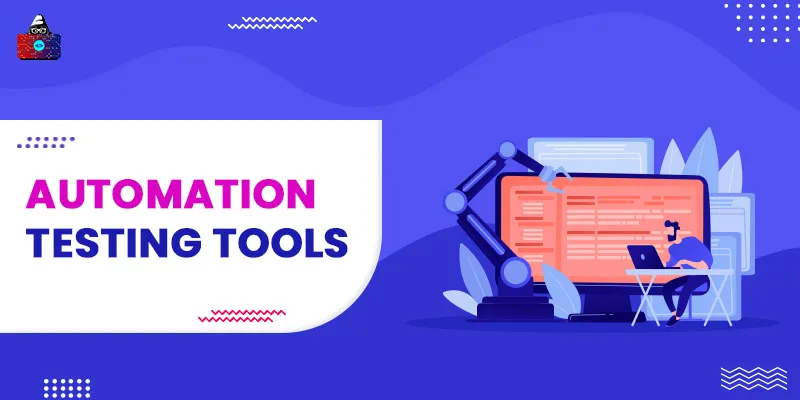Ever since automation has bowled over the world, the manual process seems like a hard drill. The added benefits of automation and plenty of reliable options available leave no room for doubts. Automation increases the accuracy, speed, and efficiency of many manual processes. Software testing is also developing and has immense options available as automation testing tools that run efficient checks on the web, mobile, and/or desktop apps to increase the quality of the final product. There are tools for checking functionality, performance, operability, database integrations, and management of a software product.
Best Automation Testing Tools
Here, we have a detailed list of the most efficient automation testing tools available:
1. EggPlant
Ask a software analyst about the 5 best automation testing tools and chances are pretty good that you’ll get Eggplant as one of the names. Eggplant is a suite of automation tools with a robust feature set and AI-driven automation. The automation testing tool has been delivering promising results. It has a unique and reliable feature set:
- Responsive and scalable interface to elevate user engagement.
- Accelerates the whole process with utmost accuracy.
- Gets integrated with a variety of tools available for easy adaptability.
- Test analytics in business-critical metrics.
- Works on an image-based approach.
- Allows testing on multiple platforms with a single script.
Eggplant is widely known for running optimum and result-oriented GUI testing. It can run many standardized as well as customized tests for stress testing, load testing, and performance testing.
2. TestComplete
TestComplete can assist with automation testing on various platforms. It elevates the accuracy and speed of software tests. With flexibility for writing test scripts, it is friendly for mavens as well as for novice software QA analysts. For extra benefits, it does support all types of programming languages, such as javascript, python, VBScript. It can set up scalable UI tests in no time. TestComplete can provide complete coverage and increased automation to software testing and can elevate the functional, performance, regression, and cross-browser testing. The latest updated version of TestComplete has an added advantage. It can now support Selenium WebDriver . The compatibility for unit testing is also incorporated in the updated version.
3. Ranorex
It is a regression testing automation tool with a robust framework and promising results. The test runs can be completely relied upon with interactive reports to know the insights of crucial parts of the test. Some of the advantages and disadvantages of using Ranorex for your automation testing are:
Advantages
- Easy tracking of UI elements of the software.
- Can function with or without a script.
- Friendly with Jira, Jenkins, TestRail integrations.
- Compatible with Windows, Linux, and macOS.
Disadvantages
- Requires coding experience for using some features.
- Expensive plans.
4. Subject7
Subject7 is one of the robust automation testing tools available and offers a code-free operation. The platform is cloud-based and supports end-to-end automation. Subject7 proves to be the new techie’s perfect mate as it allows easy test setups without the requirement of stringent coding. Some of its highlights are:
- Few-step collaboration with seamless management.
- Integrates with JIRA, Jenkins, GitHub, and most DevOps pipeline tools.
- Video defect reporting, persistent reliable reporting, and efficient data metrics.
- As it is cloud-based, security is in-built.
- Highlights and identifies the persistent defects and glitches in the software.
It has been widely adopted by significant government agencies, enterprises, DevOps enterprises, and large-sized tech setups. The licensing plans start from $175/user/month.
5. Katalon Studio
Katalon Studio is available for Windows as well as Mac users. The automation testing platform provides solutions for easy customization of automation testing and mitigates any possible hurdles or bottlenecks in automated software testing. It can integrate with JIRA and other available tools in a few steps. Its support for Java and Groovy scripts makes it the go-to tool for many software analysts. The visual representation of test results clears doubts about bugs and glitches in the software. The interactive image-based testing makes it easy to track changes and comprehend the same. The reporting is often displayed with charts, graphs, and metrics through Katalon Analytics. To further understand its interface and exciting reporting insights, a free version is available.
6. TestArchitect
This specifically works around scalable automation with complete coverage. TestArchitect is a codeless automation testing tool equipped with keyword-powered testing. It helps teams of varied expertise to collaborate on design automation tests collectively and more efficiently.
Features
- High reusability.
- Low maintenance cost.
- Supports desktop, cross-browser, mobile testing, API, computer vision testing, etc.
- Available for Windows, Linux, macOS, Androids, and iOS.
- Equipped with Integration plugins for most of the leading CI/CD/DevOps tools such as Azure DevOps, TFS, and Jenkins.
- Easy spreadsheet view for rapid comprehension.
7. QA Wolf
A young member in the automation testing tools list, QA Wolf has recently gained popularity over GitHub. It works with 3 important pillars to be the reigning champ in the list of automation testing tools; Ease, speed, and collaboration. QA Wolf speeds up the automation process several times without compromising accuracy and usability. It facilitates team collaboration for running tests and working in the same environment. The test maintenance is intuitive to help teams run project tests together.
Advantages
- Immediate and rapid test results.
- Can integrate and send Slack alerts during team collaborations.
- Scans for bugs efficiently.
- Run tests-accuracy beforehand.
- Can function without installs or multi-step setup process.
It has free as well as paid plans. The basic paid plan starts from $119/month. Customized plans are also available.
8. ACCELQ
It is one of those rare automation testing tools that automate API and web-testing while operating on the cloud. ACCELQ sets up tests 3 times faster than other automation testing tools and needs 70% lower maintenance (for test assets). It can handle complex tests without the need for any stringent or robust coding. The automation testing tool has in-built support of Salesforce Lightning and custom objects. It has artificial intelligence incorporated that further makes tests reliable and advanced. ACCELQ can enable integrations with Jira, CI/CD, AzureDevOps, Jenkins, etc. Nevertheless, it also is DevOps- and agile-ready. It perfectly fits with the ecosystem and propounds no limitations on adaptability and usability points. The platform provides free demo videos to give insights into its analytics, metrics, operability, and features.
9. Qualiberate
With increased security, efficiency, and error identification, Qualiberate is the preferred choice for many testing professionals. It can run smart automation tests to identify system bugs, functionality constraints, and operability cycle bottlenecks. Some of the reliable offerings of Qualiberate are:
- Easy integration with CI/CD tools.
- Can reuse and customize the test sets.
- Reduces risk associated with automation testing.
- Interactive recording features to set up efficient documentation and E2E regression.
Apart from these, it has a unique user interface with easy user identification points and stable checkpoints.
10. QMetry Automation Studio
QMetry Automation Studio is built on Eclipse IDE and two leading open-source software testing frameworks; Selenium and Appium. It strengthens automation testing and provides structure, reusability, and efficiency to software testing. It can support simple to complex testing environments with no risks or faults. The automation testing suite allows easy team collaborations with a hefty coding requirement. Further, it eliminates the need for special-purpose tools as it can support web, desktop, mobile, native, and hybrid components with the same level of reliability. It provides test automation, reporting, analytics, and management all in one place.
Bonus Automation Testing Tools
11. Silk Test
Silk Test is a functional and regression testing automation tool. It can test web, mobile, native, desktop applications for functional as well as for cross-browser compatibility. Its collaborative test design ensures teams can collaborate easily for automation tests and framework optimization of software. For intuitive tests, one can leverage the robust interface with easy manual points to create and customize automation tests with accelerated speed and utmost accuracy. Silk Test can run tests in Docker to provide continuous CI/ CD pipelines. It is an original Micro Focus-licensed product.
12. Watir
Watir - Web Application Testing In Ruby - works as a library for Ruby-based automation tests. Although it has optimum compatibility with web applications, it has always been criticized for not supporting the testing of mobile applications. Though Watir supports multiple browser testing in a few clicks, its poor compatibility with macOS, iOS and Android might be unacceptable to some. Nonetheless, its optimum performance and efficient workflow management have secured it a place in the list of best automation testing tools. It is readily available on RubyGems.
13. Selenium
No best automation testing tools list is complete without mentioning Selenium. It is one of the superior automation testing tools available for web application testing. It is an open-source platform with compatibility for multiple browsers and operating systems. Some of the advantages of Selenium are:
- Creates powerful browser-centered scripts.
- Mitigates risk associated with regression testing.
- Comes with integrated tools, such as Selenium WebDriver, Selenium IDE, and Selenium Grid.
- Compatible with many programming languages.
- Easy to implement and leverage usage points.
- Less hardware is required.
- More flexible.
- Easy to adapt and comprehend.
- Receives continuous updates.
14. Appium
An open-source automation testing tool, Appium eliminates any manual efforts in software testing and leaves no loopholes for faults, risks, and concerns. It allows the rapid creation of automation tests with minimal difficulty and runs accelerated regression tests. Appium supports Java, Ruby, C#, and many other programming languages of the WebDriver library. Its easy configuration and installation give it an advantage over other automation testing tools. Appium can easily be synchronized with testing frameworks like TestNG. In addition, its robust framework, easy handling, and rapid bug tracking make it a preferable automation testing tool for newbies as well as for expert software analysts.
15. Cucumber
Designed on the concept of BDD(behavior-driven development), Cucumber is an open-source platform providing optimum automation. BDD framework provides a robust implementation of team collaborations, workflows with simple to complex itineraries. It has a Gherkin editor for integrated collaborations. The documentation available provides scrutinous insights into the platform's important features and propounds no limitation on its adaptability and configuration among teams of varied sizes. Git integration connects to a regularly updated source control system to further ease and facilitate the process. Its smart and rapid operating management makes it ideal for cross-functional workflow. Cucumber has been trusted by several enterprises across the globe.
16. Gatling
Preferred by web developers worldwide, Gatling is one of the most reliable open-source automation testing tools. It can help anticipate the crashing time and response time of the websites. Some of the unique and important features of Gatling are:
- Imbibed with real-time monitoring tools.
- Features an interactive and adaptable dashboard.
- Easy integrations and configuration procedures.
- Improves the quality of team collaborations.
- Can test apps and websites for load testing.
- Opted by DevOps.
The automation testing platform provides a free demo to allow users to comprehend its functioning and value.
17. Open Test
It is an open-source automation testing tool for API testing, functional and regression testing. The automation testing platform is beginner-friendly as well as powerful for experienced developers as it doesn’t pose any stringent coding requirements. Open Test supports Javascript and is also suited for version control systems, like Git. It can run web tests with Selenium and mobile tests with Appium. Driven by data-tailored tests, Open Test eliminates the need of setting up tests multiple times and allows a test to run on multiple environments. It supports a cross-platform operation. Its parallel execution of tests makes it more reliable and the go-to automation testing tool for developers and quality assurance analysts.
Conclusion
When it comes to automation testing, the increased accuracy, speed, and efficiency lead it to popularity. As it mitigates the faults and limitations of the manual process, software analysts often prefer automation testing tools for testing simpler to complex applications. While some tools propose no limitations on the type of browser or operating systems, some operate on stringent programming languages and frameworks. While there are wide options available, one can choose the automation testing tool(s) according to their budget, features incorporated, compatibility with software to be tested, and also according to the level of team collaboration friendliness.
People are also reading:
- What is Software Testing Life Cycle?
- 10 Best Software Testing Tools
- What is Software Testing?
- Cross Browser Testing Tools
- Agile Testing Tools to Develop high Quality Software
- Integration Testing Tools
- Regression Testing Tools
- Database Testing Tools
- Open Source Security Testing Tools
- Java Testing Tools



![What is Waterfall Model? [Phases, Pros, & Cons]](/media/new_post_images/Waterfall_Model.webp)

Leave a Comment on this Post